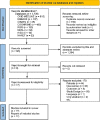Effects of non-pharmacological interventions for preventing delirium in general ward inpatients: A systematic review & meta-analysis of randomized controlled trials
- PMID: 35522654
- PMCID: PMC9075647
- DOI: 10.1371/journal.pone.0268024
Effects of non-pharmacological interventions for preventing delirium in general ward inpatients: A systematic review & meta-analysis of randomized controlled trials
Abstract
The purpose of this study was to identify the types and contents of non-pharmacological delirium prevention interventions applied to inpatients in general wards, and to verified the effectiveness of the interventions on the incidence of delirium. We performed an extensive search of bibliographic databases and registries (CENTRAL, MEDLINE, EMBASE, CINAHL, ClinicalTrials.gov and WHO International Clinical Trials Registry Platform, PubMed and Google Scholar, and Korean DB such as RISS, DBpia, KISS, NDSL and KCI) using terms to identify delirium, prevention, and non-pharmacological. We searched all databases from their inception to January 2021 and imposed restriction on language of publication in English and Korean. We included studies if they were conducted as all types of randomized controlled trials (RCT), involving adult patients aged 19 years or more who were admitted to a general ward. We included trials comparing non-pharmacological intervention versus usual care. The entire process of data selection and extraction, assessment of risk of bias with ROB2.O was independently performed by three researchers. The estimated effect size was an odds ratio (OR) and 95% confidence interval. The fixed effects model and general inverse variance estimation method were adopted. The type of non-pharmacological delirium prevention interventions for inpatients in general ward was mainly multi-component intervention to correct delirium risk factors. The content and intensity of non-pharmacological interventions varied greatly depending on the characteristics of the patient and the clinical situation. As a result of the meta-analysis, non-pharmacological multi-component intervention was effective in reducing the incidence of delirium, and it was confirmed that it was effective in reducing the incidence of delirium in both the internal and surgical wards. It was confirmed by quantitative evidence that non-pharmacological interventions, especially multi-component interventions, were effective in preventing delirium in general ward inpatients.
Conflict of interest statement
NO. The authors have declared that no competing interests exist.
Figures
Similar articles
-
Systematic review and meta-analysis on the incidence of delirium in intensive care unit inpatients after cognitive exercise intervention.Ann Palliat Med. 2022 Feb;11(2):663-672. doi: 10.21037/apm-21-3938. Ann Palliat Med. 2022. PMID: 35249344
-
Non-pharmacological interventions to prevent and treat delirium in older people: An overview of systematic reviews.Int J Nurs Stud. 2023 Dec;148:104584. doi: 10.1016/j.ijnurstu.2023.104584. Epub 2023 Aug 9. Int J Nurs Stud. 2023. PMID: 37826889 Review.
-
Effectiveness of nurse-led non-pharmacological interventions on outcomes of delirium in adults: A meta-analysis of randomized controlled trials.Worldviews Evid Based Nurs. 2024 Oct;21(5):514-527. doi: 10.1111/wvn.12739. Epub 2024 Jul 31. Worldviews Evid Based Nurs. 2024. PMID: 39086052
-
Non-Pharmacological Nursing Interventions for Prevention and Treatment of Delirium in Hospitalized Adult Patients: Systematic Review of Randomized Controlled Trials.Int J Environ Res Public Health. 2021 Aug 22;18(16):8853. doi: 10.3390/ijerph18168853. Int J Environ Res Public Health. 2021. PMID: 34444602 Free PMC article.
-
Melatonin for the prevention of postoperative delirium in older adults: a systematic review and meta-analysis.BMC Geriatr. 2019 Oct 16;19(1):272. doi: 10.1186/s12877-019-1297-6. BMC Geriatr. 2019. PMID: 31619178 Free PMC article.
Cited by
-
[Evidence-based versus expertise-based medicine in orthopedic and trauma surgery : There is nothing more practical than a good theory].Orthopadie (Heidelb). 2023 Jun;52(6):435-446. doi: 10.1007/s00132-023-04382-6. Epub 2023 May 24. Orthopadie (Heidelb). 2023. PMID: 37222750 Review. German.
-
Non-pharmacological interventions for delirium in the pediatric population: a systematic review with narrative synthesis.BMC Pediatr. 2024 Feb 12;24(1):108. doi: 10.1186/s12887-024-04595-4. BMC Pediatr. 2024. PMID: 38347509 Free PMC article.
-
Trends in Delirium and New Antipsychotic and Benzodiazepine Use Among Hospitalized Older Adults Before and After the Onset of the COVID-19 Pandemic.JAMA Netw Open. 2023 Aug 1;6(8):e2327750. doi: 10.1001/jamanetworkopen.2023.27750. JAMA Netw Open. 2023. PMID: 37548976 Free PMC article.
-
Development and evaluation of a concise nurse-driven non-pharmacological delirium reduction workflow for hospitalized patients: An interrupted time series study.Geriatr Nurs. 2024 Jan-Feb;55:6-13. doi: 10.1016/j.gerinurse.2023.10.007. Epub 2023 Nov 11. Geriatr Nurs. 2024. PMID: 37956601 Free PMC article.
-
Prevention of Delirium in the Intensive Care Unit through Nonpharmacological Interventions: An Umbrella Review.Indian J Crit Care Med. 2025 Jan;29(1):75-83. doi: 10.5005/jp-journals-10071-24884. Epub 2024 Dec 30. Indian J Crit Care Med. 2025. PMID: 39802256 Free PMC article.
References
-
- American Psychiatric Association. Diagnostic and statistical manual of mental disorders, 5th edition. Washington, DC: American Psychiatric Publishing; 2013. p. 596–601.
-
- Webber C, Watt CL, Bush SH, Lawlor PG, Talarico R, Tanuseputro P. Hospitalization outcomes of delirium in patients admitted to acute care hospitals in their last year of life: A population-based retrospective cohort study. J Pain Symptom Manage. 2021;61(6):1118–1126.e5. doi: 10.1016/j.jpainsymman.2020.10.029 - DOI - PubMed
Publication types
MeSH terms
LinkOut - more resources
Full Text Sources
Medical
Research Materials
Miscellaneous





